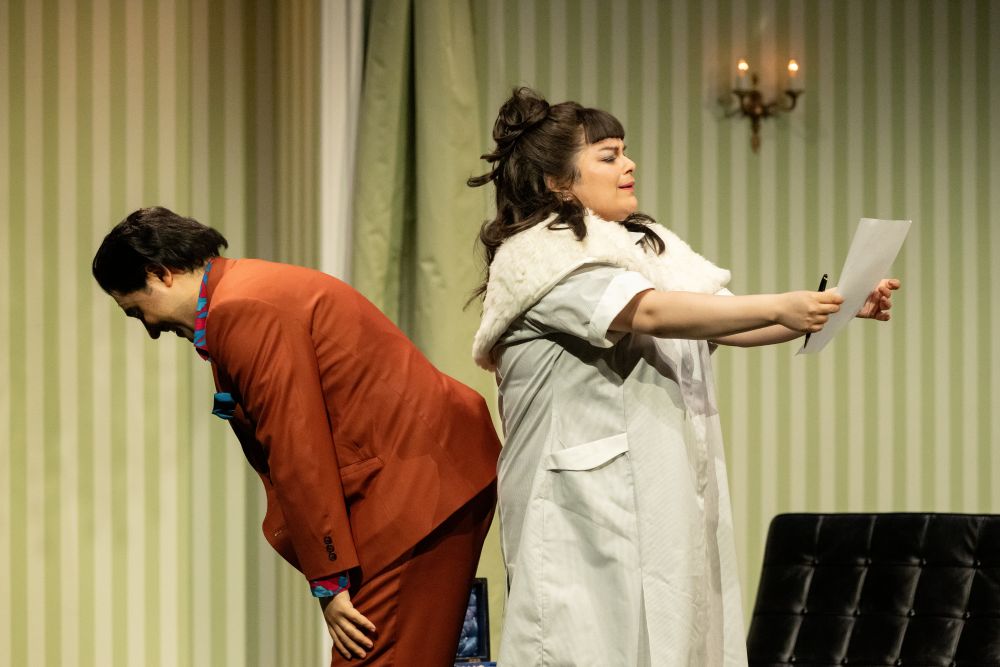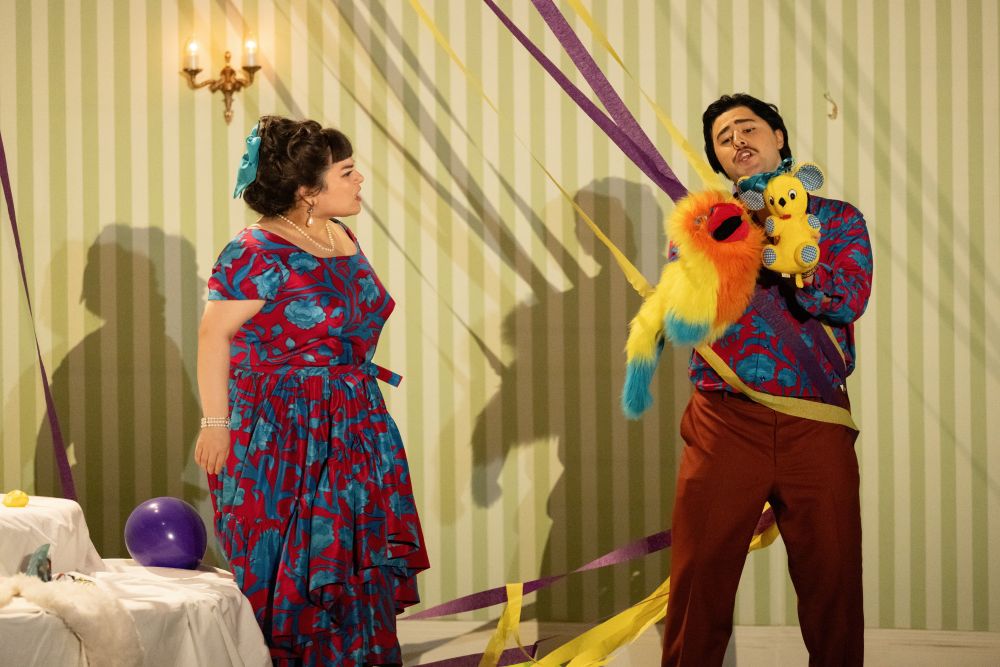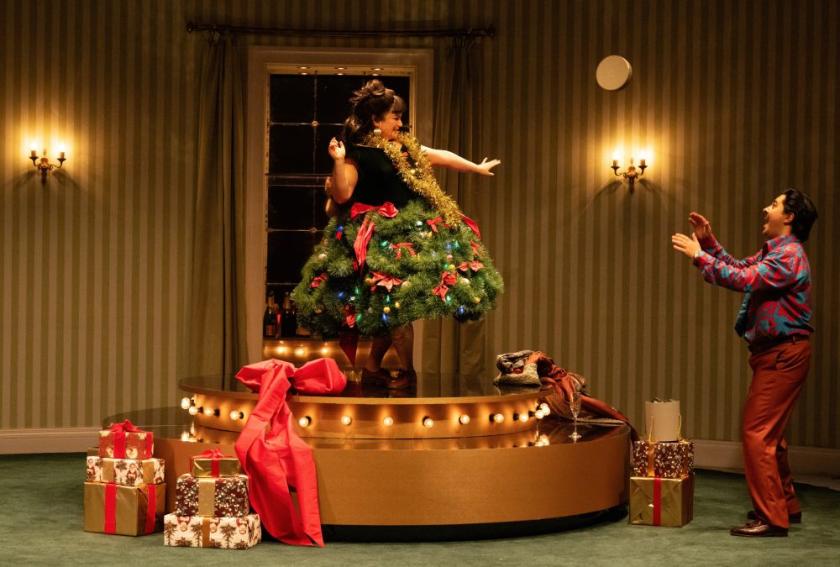Full marks to the Royal Opera for good planning: one first night knocking us all sideways with the darkest German operatic tragedy followed by another letting us off the hook with a short comedy by Wagner’s compatriot Telemann. The premiere of Pimpinone predates that of Die Walküre by nearly a century and a half and we mark its 300th anniversary this year. But is it too slight for resurrection?
Initially I wondered. The first of Telemann’s three acts, each originally placed as an intermezzo within the composer’s adaptation of Handel’s opera seria Tamerlano for his polyglot city of Hamburg, is all froth in several arias and a duet. I’d expected a line-up of the Royal Opera’s Jette Parker Young Artists, such as we’ve had before in the Linbury Theatre; this time there are only two singers, Chilean soprano Isabela Díaz and Armenian baritone Grisha Martirosyan, but how hard they work and what a cumulative impact they make. You see at one point how they’d make a wonderful Count and Susanna in Le nozze di Figaro, at another how this could be a double bill with Wolf-Ferrari’s delicious one-acter Il segreto di Susanna.  We instantly like Díaz’s Vespetta, gifted with a face made for comedy and a lyric soprano of great style which gathers weight as the evening progresses. Don’t ask why the maid is masterminding wealthy Pimpinone’s Christmas party; that’s one of many glosses by director Sophie Gilpin, but it gives designer Anna Yates a gift in Vespetta’s crazy lit-up tree-dress and outrageous hat. The libretto is daft, a version in German by Johann Philip Praetorius of the Italian original by Pietro Pariati, and intrinsically funny only in a very naïve way, and the opera’s alternative titles unpromising – The Unequal Marriage, or The Tyrannical Chamber-Maid – but Gilpin has her own ideas on this unequal battle of the sexes.
We instantly like Díaz’s Vespetta, gifted with a face made for comedy and a lyric soprano of great style which gathers weight as the evening progresses. Don’t ask why the maid is masterminding wealthy Pimpinone’s Christmas party; that’s one of many glosses by director Sophie Gilpin, but it gives designer Anna Yates a gift in Vespetta’s crazy lit-up tree-dress and outrageous hat. The libretto is daft, a version in German by Johann Philip Praetorius of the Italian original by Pietro Pariati, and intrinsically funny only in a very naïve way, and the opera’s alternative titles unpromising – The Unequal Marriage, or The Tyrannical Chamber-Maid – but Gilpin has her own ideas on this unequal battle of the sexes.
The second movement of Telemann’s Sinfonia Spirituosa in D, soulfully played by English National Opera instrumentalists directed from the harpsichord by Jette Parker conductor Peggy Wu suggests a darkening of mood ahead before Scene Two. Not immediately: Vespetta, having obtained her coveted chambermaid post chez Pimpinone, spends a lot of the scene trying to stop him spending all his money, but doesn’t mind so much when he spends it on her, and she agrees to the marriage contract (pictured above). The duet here celebrating the much-anticipated marriage zings: one extractable number from the comedy, surely.  More follow in Scene Three. The couple have had a child and been together for four years, at least according to Gilpin. She humanises the trope of the shrew dominating the rich fool: this time there are two duets, including a patter quarrel, preceded by an aria which actually gets a well-deserved round of applause as Martirosyan carries off a spate of falsetto. Gilpin stops the repetition palling by introducing two of the kid’s toys as “neighbours” (pictured above). Martirosyan also introduces some long-breathed phrasing as Telemann gives Pimpinone some surprising pathos in the last duet. Vespetta has her way, of course, but in these characterisations there’s more a suggestion of a fiery couple meeting in the middle: a genuine happy end. Another well-timed triumph for the Jette Parker Programme, and feathers in both caps/hats.
More follow in Scene Three. The couple have had a child and been together for four years, at least according to Gilpin. She humanises the trope of the shrew dominating the rich fool: this time there are two duets, including a patter quarrel, preceded by an aria which actually gets a well-deserved round of applause as Martirosyan carries off a spate of falsetto. Gilpin stops the repetition palling by introducing two of the kid’s toys as “neighbours” (pictured above). Martirosyan also introduces some long-breathed phrasing as Telemann gives Pimpinone some surprising pathos in the last duet. Vespetta has her way, of course, but in these characterisations there’s more a suggestion of a fiery couple meeting in the middle: a genuine happy end. Another well-timed triumph for the Jette Parker Programme, and feathers in both caps/hats.















Add comment